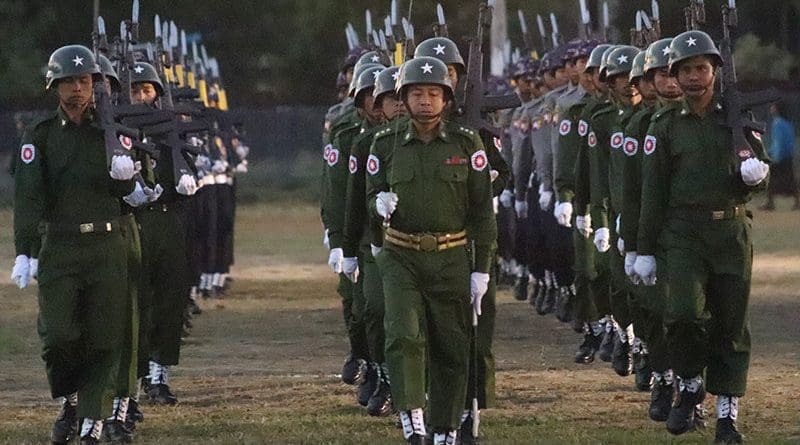Why Russia Is Betting On Myanmar’s Military Junta – Analysis
By Artyom Lukin and Andrey Gubin*
On 1 February 2021, Myanmar’s military junta declared a state of emergency and seized power from the civilian government led by Aung San Suu Kyi. The coup immediately created a political crisis and resulted in mass bloodshed, but the international response has been divided.
While the US-led West and its key Asian allies such as Japan and South Korea condemn the coup and imposed sanctions on the junta, other key powers are more ambivalent. In the UN Security Council, China, India and Russia have made efforts to shield the perpetrators from harsher censure and potential UN sanctions.
From the very beginning Russia has refused to condemn the coup, with the Ministry of Foreign Affairs merely expressing hope for ‘a peaceful settlement of the situation through the resumption of political dialogue’. In the same statement, Moscow noted as an encouraging sign that the military intended to hold a new parliamentary election. Russian state-owned news agency RIA Novosti justified the coup by arguing that the Myanmar army, the Tatmadaw, is the only viable guarantor of the multi-ethnic country’s unity and peace.
The most visible manifestation of Russian support for the junta came in late March, when Deputy Minister of Defence Alexander Fomin became the highest-ranking foreign official to attend Myanmar’s Armed Forces Day parade in the capital Naypyidaw. While the military was violently cracking down on protestors, Fomin held talks with junta leader Senior General Min Aung Hlaing. He called Myanmar ‘Russia’s reliable ally and strategic partner in Southeast Asia and the Asia Pacific’ and emphasised that Moscow ‘adheres to the strategic course of enhancing relations between the two countries’.
There are several reasons why Russia is emerging as the most high-profile supporter of the Myanmar military government.
Moscow’s close ties with Myanmar date back to the 1950s. Given that for most of its modern history the Southeast Asian country has been governed by the military, Russia has developed a working relationship with its uniformed rulers. Incumbent strongman general Min Aung Hlaing has visited Russia on numerous occasions, most recently in June 2020 to attend the Victory Day parade in Moscow, and is known as a champion of Myanmar–Russia ties.
Under Min Aung Hlaing, Myanmar–Russia military cooperation has received a boost. After China, Russia is the country’s second largest supplier of arms, being the source of at least 16 per cent of weaponry procured by Myanmar from 2014–2019. Myanmar’s military is now awaiting the delivery of six Su-30 fighter jets ordered in 2019, and in January 2021 the two sides signed contracts for a Russian air defence system and a suite of surveillance drones.
Thousands of Myanmar’s military officers have also received training in Russia’s military academies. Tellingly, the Myanmar commander-in-chief maintains an official account on Russia’s VK social network while being banned from Facebook and Twitter. It is not coincidental that the Kremlin’s main interlocutor with Myanmar is defence minister Sergey Shoigu, who happened to visit the country just several days before the 1 February coup.
Given this long-standing and profitable relationship with the Myanmar military, it stands to reason that Russia is not going to condemn the coup, let alone sanction the junta. Russian President Vladimir Putin has never been known for his sympathies for pro-democracy movements backed by the West, and the Kremlin hardly sees the English-educated Aung Sang Suu Kyi, whose two sons are British nationals, as a desirable alternative to uniformed rulers.
Moscow’s support for a military dictatorship could damage its international reputation, but with what has already transpired between Putin and the West, the Kremlin could hardly care less about its reputational fallout from Myanmar. In defence of its stance on Myanmar, Russia could also point to Western hypocrisy — neighbouring Thailand is ruled by generals with dubious democratic credentials, but the country remains in the West’s good graces due to being a ‘treaty ally’ of the United States.
It is unclear to what extent Moscow will coordinate its Myanmar policies with Beijing, Russia’s main strategic partner and a fellow autocracy. The Chinese government has refrained from condemning the military takeover, but compared to Russia it has been conspicuously less supportive — China’s relationship with the Tatmadaw has always been complicated, and Beijing is hardly happy about the coup.
Whereas Moscow’s relationship to Myanmar is mostly limited to military-to-military ties, with scant social and economic interactions, China’s relations with its southern neighbour are more multi-dimensional. Beijing cannot afford to antagonise pro-democracy segments of Myanmar’s population, so it needs to adopt a more complex approach.
Moscow and Beijing are likely discussing the situation in Myanmar, but their strategies differ. Russia is driven by the desire to keep lucrative military contracts and possibly gain a foothold in the Indian Ocean. By contrast, Beijing is guided by more long-term strategic interests dictated by Myanmar’s immediate proximity to China’s Yunnan province.
Viewing itself as a global great power, Russia has a stake in maintaining a strategic presence in Myanmar, a geopolitically important country in the Indo-Pacific. To retain and expand Russia’s links with Myanmar, the Kremlin has banked on the generals. It remains to be seen if Moscow’s calculus will turn out to be the right one.
*About the authors:
- Artyom Lukin is Associate Professor at the Oriental Institute, School of Regional and International Studies, Far Eastern Federal University, Vladivostok.
- Andrey Gubin is a Senior Researcher at the Russian Institute for Strategic Studies, Moscow.
Source: This article was published by the East Asia Forum

